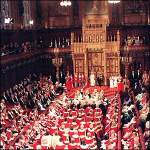26 May
2010
The Beauty of a Lady, and the Beauty of a Lord
Posted in British Politics, Public Policy
How wonderful this modern world is. I can phone-in to kick politicians out of X-factor, and vote online to show—within a few hours of television debate—how Nick Clegg is as good as Winston Churchill. Why can’t politics work like that all the time? I wish I could have texted-in to oust the Royal Family when they didn’t do a press conference straight after Diana’s death. And why didn’t the parliamentarians listen when a YouGov poll showed how much I want the police to lock-up Arabs for at least 90 days? But I’m getting distracted. I was supposed to be spending my journey to work facebooking the PM to tell him how much of a jack-ass he is.
And at every turn I’m glad nobody knows who I am, and that nobody compares what I said yesterday to what I’m saying today. I’m free and nobody can tell me what to do. I’m the power in politics. The people have won and at last we can decide whatever we like. This is democracy.
But somewhere along the way I lost my democratic credentials. What part of my iPhone can I use to vote civic responsibility back in?
Socrates was killed by democracy, and so Plato wrote the Republic, a radical critique of rule by the mob. What Plato saw in the life of Socrates he sees contended in the life of every citizen: that though a society may be said to be freer than any before it, yet can its civic identity be lost along the way.
Real people power is actually something much simpler than the comparisons of voting systems suggest. People power happens when people get together to solve problems they cannot face on their own. This is actually what politics is—a truth that helps explain the recent buzz around community organising as the new politics.
The relentless way our political leaders are dangling House of Lords reform (50% elected, at least!) makes the people of Britain look like caged monkeys desperate for bananas. But if we are hungry for real democracy it is because of the failures of democratic Members of the Lower House. Having channelled funds into PR instead of community organising, political parties have seen their membership base collapse. Why this reverse display of people politics should be thrust into the Upper House is not clear.
Contrary to what party leaders imply, we have not avoided direct democracy because it is just too much paperwork. That assessment would give too much credit to their ability to purposefully avoid reform. Rather, we are happy to live in a representative democracy because we value virtuous leadership and the expert protection of civil liberties.
Neither of these is provided by twice-a-decade elections or incessant opinion polling. To get virtuous leadership, a few things are required. First, leaders have to be people movers and not camera movers. Those in the Lower House are just about getting the cameras moving slowly, and they are selected primarily on their inability to move people. After all, a real community organiser is dangerous. By getting to know particular people and particular problems, a politician might end up voting against the party. They would tip the boat against what the opinion polls have told us, and argue against the majority on the grounds of having gotten to know the problems suffered by a minority.
Second, a virtuous leader needs to be the same person yesterday, today and tomorrow. Tony Blair was great because he wasn’t, and Gordon Brown was awful because he was. To be a leader has become the worst thing you can do in the Commons.
Thirdly, and most importantly, a virtuous leader needs to serve. This means one must put the needs of others before oneself, and offer responsibility for the mistakes of the past, though they were not brought in under you.
An expert protection of civil liberties is further, essential component of representative democracy. The previous Parliament proved that this is not guaranteed by the Commons. Whilst embellishing on expense claims, MPs voted in majority for extensions to 28 and then 42 days without trial, child detention for asylum seekers, the requirement of all British citizens to carry I.D. cards, and the creation of a law for “hate” speech.
If I owned a PR firm I would offer to re-brand the beauty of Ladies and Lords by showing how the Upper House has been the only democratic institution over the past decade, aside from the media. But I know that they would not employ me. Their interest in politics lies elsewhere.
(Photo credit: FordBentall)

Leave a Reply